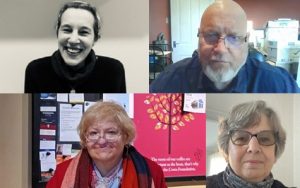In 2011, Charlotte Moss was diagnosed with stage three melanoma.
Sadly, she was told that chemotherapy and radiotherapy would not be effective and was advised that the only option was to wait and see what happened.
Understandably, this was incredibly difficult for her and her family. But thankfully, soon after, Charlotte was invited to join an immunotherapy trial.
Charlotte Moss, Clinical trial patientWhen they peeled back the covering of the node, it was all cancer. It started to dawn on me just how serious this was. It was scary.
At this time, only one significantly successful immunotherapy trial had previously taken place on melanoma. Although only marginally increasing the life expectancy in terminally ill patients, it was the first time any positive results had been shown. Charlotte jumped at the chance to take part and has now been living cancer free for more than 10 years.
Charlotte played a key role on our campaign to build the Centre for Cancer Immunology by sharing her experience of living with cancer and being on a clinical trial at events and on our website.
She was therefore delighted to see the University hit the ┬ú25million target in 2018, so much so, she didnÔÇÖt want her involvement with the Centre to end.
One of the most powerful things is hope. I went from being in complete despair, to having hope that I might survive longer than I originally thought. That hope completely lifted me up.
ÔÇ£Being involved in the universityÔÇÖs campaign was amazing,ÔÇØ Charlotte explained. ÔÇ£It was so meaningful to be behind something that would help a lot of people, especially after experiencing cancer myself. It was a great moment when we hit the target and then when it opened, but then I felt ÔÇÿwhatÔÇÖs next?ÔÇÖ ÔÇÿWhat else can I do?ÔÇÖÔÇØ
Charlotte got in touch to see what other opportunities she could be involved in and spoke with colleagues at the Southampton Clinical Trials Unit (SCTU), a facility within the Centre, which designs, implements and manages clinical trials.
The Southern Cancer Trials Public Involvement Group, pictured right, which provides feedback and input in new cancer trials, was being established and Charlotte decided to take part.
Working alongside our researchers and trial teams, the Forum ensures the interests of patients are at the heart of everything we do. The group is made up of patients, family members of patients and other interested people. They meet regularly throughout the year to discuss trials, funding proposals and patient communications.

ÔÇ£I really wanted to be able to keep giving something back. ItÔÇÖs so good to see whatÔÇÖs going on at the Centre and to play a part in shaping what trials and other activities are taking place. ItÔÇÖs really important to have patient representation at the beginning of the clinical process and a fresh perspective, so doctors and scientists can see it from our side. We may be able to offer a side that has not been considered yet, that may be the difference in how successful a trial is. ThereÔÇÖs a really good mix of people, from different backgrounds, different ages, all with different viewpoints. We have some insightful discussions and have been able to make a significant contribution.ÔÇØ
Charlotte was recently diagnosed as neurodivergent, a term which means someone has a brain that works differently from the average or ÔÇ£neurotypicalÔÇØ person. This may be differences in social preferences, ways of learning, ways of communicating or ways of perceiving the environment. Charlotte says her diagnoses has helped her help enhance how the SCTU communicates with patients.
ÔÇ£Some people cannot take in lots of written information,ÔÇØ she explained. ÔÇ£For me, I need to be told something two or three times before it starts to sink in. We need to make things really easy for people to understand, especially when it comes to something as serious and personal as cancer. The Centre have been amazing with the group, they are open minded to our suggestions and input and there are no stupid questions. ItÔÇÖs been a great experience so far and I am looking forward to continuing to help shape future trials.ÔÇØ
I donÔÇÖt think I would be here if it wasnÔÇÖt for the drug and the trial that I was on at Southampton. I feel very lucky.